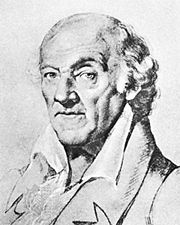
Karl Ludwig von Knebel
Encyclopedia

Wallerstein
Wallerstein is a surname, which can refer to:* Immanuel Wallerstein , U.S. sociologist* Jim Wallerstein , guitarist and vocalist* Michael Wallerstein , political scientist* Robert S...
in Franconia
Franconia
Franconia is a region of Germany comprising the northern parts of the modern state of Bavaria, a small part of southern Thuringia, and a region in northeastern Baden-Württemberg called Tauberfranken...
.
After having studied law for a short while at Halle
Halle, Saxony-Anhalt
Halle is the largest city in the German state of Saxony-Anhalt. It is also called Halle an der Saale in order to distinguish it from the town of Halle in North Rhine-Westphalia...
, he entered the regiment of the crown prince
Crown Prince
A crown prince or crown princess is the heir or heiress apparent to the throne in a royal or imperial monarchy. The wife of a crown prince is also titled crown princess....
of Prussia
Prussia
Prussia was a German kingdom and historic state originating out of the Duchy of Prussia and the Margraviate of Brandenburg. For centuries, the House of Hohenzollern ruled Prussia, successfully expanding its size by way of an unusually well-organized and effective army. Prussia shaped the history...
in Potsdam
Potsdam
Potsdam is the capital city of the German federal state of Brandenburg and part of the Berlin/Brandenburg Metropolitan Region. It is situated on the River Havel, southwest of Berlin city centre....
and was attached to it as officer for ten years. Disappointed in his military career, owing to the slowness of promotion, he retired in 1774, and accepting the post of tutor to Prince Konstantin of Weimar
Weimar
Weimar is a city in Germany famous for its cultural heritage. It is located in the federal state of Thuringia , north of the Thüringer Wald, east of Erfurt, and southwest of Halle and Leipzig. Its current population is approximately 65,000. The oldest record of the city dates from the year 899...
, accompanied him and his elder brother, the hereditary prince, on a tour to Paris. On this journey he visited Goethe in Frankfurt-on-Main, and introduced him to the hereditary prince, Charles Augustus. This meeting is memorable as being the immediate cause of Goethe's later intimate connection with the Weimar court.
After Knebel's return and the premature death of his pupil he was pensioned, receiving the rank of major. In 1798 he married the singer Lönise von Rudorf, and retired to Ilmenau
Ilmenau
Ilmenau is a town located in the district of Ilm-Kreis, Thuringia, Germany.Ilmenau is situated in the valley of the Ilm river, at an altitude of 431 metres above sea level, and is the biggest town in Ilm-Kreis district, with 6,200 students studying at the Technische Universität Ilmenau. The...
; but in 1805 he removed to Jena
Jena
Jena is a university city in central Germany on the river Saale. It has a population of approx. 103,000 and is the second largest city in the federal state of Thuringia, after Erfurt.-History:Jena was first mentioned in an 1182 document...
, where he lived until his death in 1834.
Knebel's Sammlung kleiner Gedichte (1815), issued anonymously, and Distichen (1827) contain many graceful sonnet
Sonnet
A sonnet is one of several forms of poetry that originate in Europe, mainly Provence and Italy. A sonnet commonly has 14 lines. The term "sonnet" derives from the Occitan word sonet and the Italian word sonetto, both meaning "little song" or "little sound"...
s, but it is as a translator that he is best known. His translation of the elegies of Propertius, Elegien von Properz (1798), and that of Lucretius
Lucretius
Titus Lucretius Carus was a Roman poet and philosopher. His only known work is an epic philosophical poem laying out the beliefs of Epicureanism, De rerum natura, translated into English as On the Nature of Things or "On the Nature of the Universe".Virtually no details have come down concerning...
, De Rerum Natura (2 vols., 1831) are deservedly praised. Since their first acquaintance Knebel and Goethe were intimate friends, and not the least interesting of Knebel's writings is his correspondence with the eminent poet, Briefwechsel mit Goethe (ed. G. E. Guhrauer, 2 vols., 1851).

